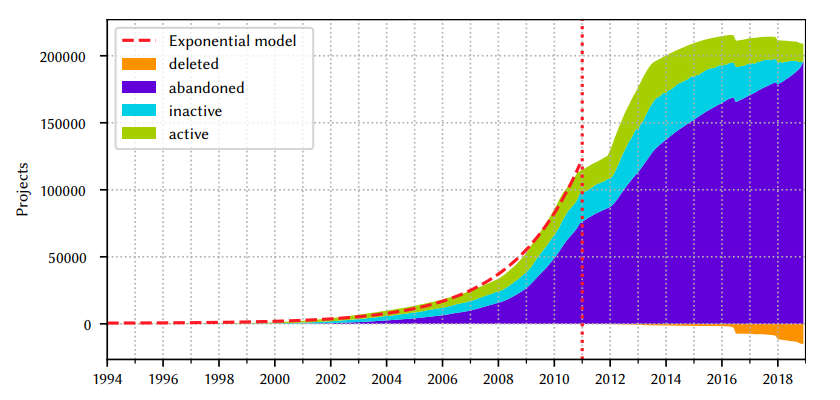| Open Source Is Not Growing Anymore |
| Written by Mike James | |||
| Wednesday, 19 August 2020 | |||
|
Open source, we all love it when it comes to using it, but not so much when it comes to contributing to it. How often have you wished for an improvement or a bug fix, but resisted the call to roll up your own sleeves and do the job? It seems the production side of open source has a problem and open source isn't growing anymore. The latest research on the phenomena comes from Michael Dorner, Blekinge Institute of Technology, Maximilian Capraro, Friedrich-Alexander-University Erlangen and Ann Barcomb, University of Calgary and Friedrich-Alexander-University Erlangen, and looks at the patterns of behavior for over 224,000 open source projects over 25 years. Previously it had been found that Open Source grew exponentially with respect to lines of code and number of projects. The current study found this to be true, but only up to 2012 for lines of code and until 2011 for project numbers. Now at this point you are no doubt saying that exponential growth isn't sustainable in reality; and I would agree. Exponential growth is nearly always a precursor to some more gentle and physically possible expansion. In this case, however, the situation isn't just a move to sub-exponetial growth; things seem to be slowing down.
You can see that after 2015 the lines of code stop increasing at all - hence "Open Source isn't growing". This is supported by the drop in the number of commits over time. After 2015 commits go into free fall and are back to their 2007 levels during exponential growth. More depressing is the next finding: "The vast majority of open source projects are abandoned; they have never received a contribution again until the end of measurement or their deletion."
The loss of inactive projects at the end of the time period is an artifact caused by considering any inactive project that hasn't had a contribution by the end of the study as abandoned. The final proof that there is a decline is in the contributor figures Although growing exponentially until March 2010 and reaching its peak in March 2013 with 107,915 contributors, the number of open source contributors has, as of 2018, decreased to the level of 2008. So we can look back onto the halcyon period, starting in about 2000 and ending in 2010 or thereabouts, when Open Source was growing exponentially on a number of measures. So why has Open Source not only stopped growing exponentially but actually declined? The paper has some suggestions:
Do any of these ring true? As a lapsed open source contributor I can relate to some of these suggestions, but recently (in the timeframe of the reported decline) I've considered contributing to three projects that I have been using very heavily and hence got to know very well, and have modified the source code. What stopped me from joining in? The first case was an Apache project and the governance issues seemed more complex and overwhelming than the patches I would have proposed. In the second case the project imposed a set of coding styles that I hadn't used in my coding and frankly didn't agree with. The time and effort to put my mods into their canonical format it wasn't worth the boredom. The third project was so badly documented that I couldn't figure out if what I had done was reasonable or not and I received a de-motivating response from the maintainer telling me to figure it out. Put simply, the days of writing some code, submitting it and then hacking on it in a group seem to be long gone. What we have are ove- regulated projects that have a focus on governance and submitting compliant code that needs no further work from anyone else. Yes it's anecdotal evidence and it needs to be treated as such - perhaps you have other reasons.
More InformationQuo Vadis, Open Source? The Limits of Open Source Growth Related ArticlesPromoting Open Source Software What Attracts Devs To Open Source Why Students Participate in Summer of Code Code Borrowing and Licence Violations What Eats Your Programming Time Promoting Open Source Software To be informed about new articles on I Programmer, sign up for our weekly newsletter, subscribe to the RSS feed and follow us on Facebook or Linkedin.
Comments
or email your comment to: comments@i-programmer.info <ASIN:B00DTZTFKY> <ASIN:B08BDGXVK9> |
|||
| Last Updated ( Wednesday, 19 August 2020 ) |




